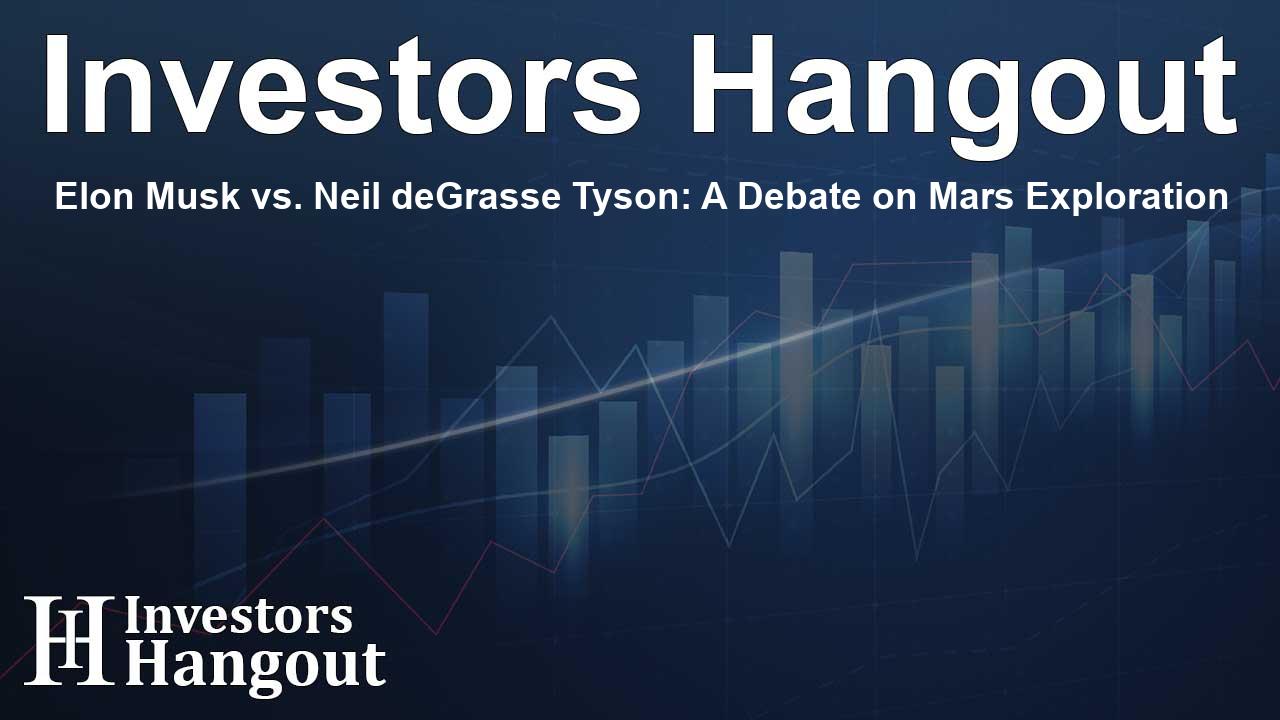Elon Musk vs. Neil deGrasse Tyson: A Debate on Mars Exploration

Elon Musk and Neil deGrasse Tyson: A Dialogue on Mars Exploration
In a recent conversation that has sparked widespread interest, renowned astrophysicist Neil deGrasse Tyson expressed skepticism about Elon Musk's vision for colonizing Mars. Tyson, who has a profound understanding of space exploration, argues that such ambitious endeavors are highly dependent on geopolitical factors rather than pure exploration motivation.
Tyson’s Perspective on Space Exploration
Tyson articulated his views in an interview, emphasizing that historically, major space ventures have been driven by the need for competitive advantage. He explained that significant projects, especially in space, tend to emerge in times of geopolitical tension, where nations feel the need to assert their dominance. He referred to this historical pattern as a crucial element in the feasibility of missions like those proposed by Musk.
The Cost of Mars Missions
Tyson pointed out the financial challenge of undertaking a mission to Mars without clear geopolitical reasoning. He illustrated his point by envisioning a hypothetical meeting with venture capitalists where Musk proposes a Mars mission costing up to $1 trillion, without promising any profit. This scenario illustrates the difficulty in garnering investment for a mission perceived as highly risky, with uncertain returns.
Musk’s Response to Criticism
Elon Musk's reaction to Tyson's remarks was immediate and reflective of his forward-thinking perspective. Musk dismissed Tyson’s viewpoint, expressing confidence in the long-term benefits of Mars exploration for humanity. He believes that establishing a human presence on Mars is essential for the survival of consciousness itself.
Funding Mars: Beyond Traditional Investors
Musk emphasizes that he is not seeking traditional venture capital for his Mars ambitions. Instead, he is gathering resources through other means, notably through revenue generated by SpaceX's projects, including its satellite internet service, Starlink. This approach separates Musk from typical business practices, as he aims to fund his Mars vision through innovative and alternative streams.
SpaceX’s Starship: The Vehicle for Mars?
SpaceX is currently developing its Starship launch vehicle, intended for missions to Mars. The company has conducted multiple test flights, refining the technology needed for ambitious space travel. Gwynne Shotwell, SpaceX President and COO, recently projected that many Starship launches could take place in the coming years, indicating the company's commitment to advancing their space exploration goals.
Starlink as a Revenue Source
SpaceX's Starlink project is already bringing in revenue, with Shotwell confirming that the company expects to earn money from it this year. This financial backing could play a crucial role in supporting SpaceX's overall vision, including its Mars mission. Shotwell noted that while Starlink is profitable, the transformative potential of Starship constitutes the key to making SpaceX one of the most valuable companies globally.
Reflections on Earth and Mars
Interestingly, Tyson suggests that rather than investing heavily in making Mars habitable, it would be more prudent to focus our investments on preserving and improving Earth. His arguments highlight the paradox of space exploration—the desire to seek new frontiers while also ensuring the health of our home planet.
Conclusion
The discourse between Neil deGrasse Tyson and Elon Musk encapsulates the spirited debate on the future of space exploration. While both figures have contributed significantly to the conversation, they represent fundamentally different philosophies regarding humanity's next steps in conquering the cosmos. Tyson's cautious view reflects a pragmatic approach, whereas Musk’s vision paints a bold, expansive future for human presence beyond Earth. As developments continue in this pressing field, it is clear that both visionaries have plenty to contribute to society's understanding of our place in the universe.
Frequently Asked Questions
What are Neil deGrasse Tyson's main arguments against Mars colonization?
Tyson argues that significant space missions are usually prompted by geopolitical needs rather than exploration alone, making investment challenging.
How does Elon Musk view the importance of Mars?
Musk believes Mars is essential for the long-term survival of consciousness and is committed to establishing a human presence on the planet.
What is SpaceX's current progress with the Starship?
The Starship is currently in the development phase, with several successful test flights aimed at refining the technology for future Mars missions.
How is SpaceX funding its Mars exploration ambitions?
SpaceX is focusing on revenue generated through projects like Starlink to fund its vision for Mars, rather than seeking traditional venture capital.
What is the main takeaway from the Tyson-Musk debate?
The discussion highlights the contrasting perspectives on space exploration, emphasizing both the ambitious hopes for Mars colonization and the importance of addressing Earth's challenges.
About The Author
Contact Thomas Cooper privately here. Or send an email with ATTN: Thomas Cooper as the subject to contact@investorshangout.com.
About Investors Hangout
Investors Hangout is a leading online stock forum for financial discussion and learning, offering a wide range of free tools and resources. It draws in traders of all levels, who exchange market knowledge, investigate trading tactics, and keep an eye on industry developments in real time. Featuring financial articles, stock message boards, quotes, charts, company profiles, and live news updates. Through cooperative learning and a wealth of informational resources, it helps users from novices creating their first portfolios to experts honing their techniques. Join Investors Hangout today: https://investorshangout.com/
The content of this article is based on factual, publicly available information and does not represent legal, financial, or investment advice. Investors Hangout does not offer financial advice, and the author is not a licensed financial advisor. Consult a qualified advisor before making any financial or investment decisions based on this article. This article should not be considered advice to purchase, sell, or hold any securities or other investments. If any of the material provided here is inaccurate, please contact us for corrections.
